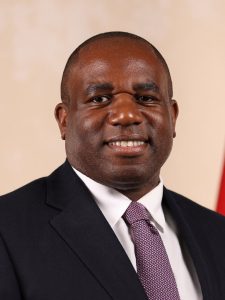In a world teetering on the edge of geopolitical instability, last week’s G7 Foreign Ministers’ meeting stood as a testament to Western unity and resolve.
While sceptics doubted whether consensus could be reached, and adversaries hoped for division, the outcome was clear: Britain and its allies emerged with a steadfast commitment to national security, global stability, and the defence of democratic values.
At the heart of the discussions was Ukraine, a nation that has borne the brunt of Russian aggression for over two years. The United States and Ukraine have reached a pivotal moment, with a ceasefire offer now on the table and renewed military support flowing to Kyiv. This signals that Ukraine remains determined to secure a just and lasting peace under President Zelensky’s leadership.
The question now lies with Vladimir Putin. Is Moscow genuinely interested in peace, or will it continue to deploy delay tactics while keeping up its relentless assault on Ukrainian sovereignty? The British government has made its stance clear: a full and unconditional ceasefire is the only viable path forward. But there are no illusions about Russian intentions. As of now, there is no indication that Putin is willing to relent.
To counter Russian defiance, the G7 reinforced its commitment to economic and military pressure. Sanctions have already weakened the Russian economy, with inflation surging and social spending plummeting. The UK and its allies are prepared to go further, targeting Russia’s defence sector and fossil fuel revenues while mobilising European partners to take greater responsibility in supporting Ukraine’s defence.
London is leading the charge with a major boost in defence spending—the largest since the Cold War. British forces are enhancing Ukraine’s capabilities through increased training, additional drones, and critical munitions. This military backing is matched by diplomatic engagement, with Foreign Secretary David Lammy hosting EU High Representative Kaja Kallas to strengthen UK-EU security cooperation. If Ukraine’s allies remain unified, they can shape both the outcome of this war and the post-war order that follows.
____________________________________________________________________________________________________________________

“At the G7, the UK and our allies were united in our unwavering support for Ukraine’s defence of its freedoms; united in support for Ukraine’s pursuit for peace; and united on what is required to make that happen. Now it is Putin who stands in the spotlight, Putin who must answer, and Putin who must choose.
“Are you serious, Mr Putin, about peace? Will you stop the fighting, or will you drag your feet and play games, and pay lip service to a ceasefire while still pummelling Ukraine? My warning to Mr Putin is this: if you are serious, prove it, with a full and unconditional ceasefire now” – UK Secretary of State for Foreign, Commonwealth and Development Affairs David Lammy.
____________________________________________________________________________________________________________________
The Middle East and Beyond
The G7’s focus extended beyond Europe. The fragile ceasefire in Gaza remains a pressing concern, and the UK’s position is firm: Hamas must release all hostages, and Israel must allow the unrestricted flow of humanitarian aid. Britain is calling on the Israeli government to ensure that essential supplies reach Palestinian civilians, warning that aid should never be leveraged as a political tool.
Elsewhere, Iran’s aggressive posturing remains a major security threat. Tehran’s nuclear programme is advancing at an alarming rate, violating the limits of the now-defunct Joint Comprehensive Plan of Action. The G7 sent a strong message that Iran must de-escalate and return to diplomacy, or face continued international pressure. The United States’ decisive response to Houthi attacks on international shipping is a sign that the West will not tolerate further Iranian-backed destabilisation.
In Africa, Sudan’s humanitarian catastrophe was condemned in the strongest terms. Britain is preparing to host an international conference aimed at revitalising peace efforts and breaking the cycle of violence. Similarly, Rwanda’s interference in the Democratic Republic of the Congo drew sharp criticism, with a united call for an immediate withdrawal of forces.
A Firm Stand on Global Security
The G7’s agenda also addressed the need for stronger deterrence measures against future Russian aggression. Britain and France are spearheading efforts to create a security coalition that would prevent Moscow from attempting another land grab in Eastern Europe. However, this initiative will require US support to be truly effective. The UK has already convened a high-level gathering to push this plan forward, reinforcing its leadership role on the international stage.
Meanwhile, maritime security has emerged as a critical issue, with growing threats from the Red Sea to the South China Sea. Canada’s new leadership is taking the helm of a maritime security initiative, a move warmly welcomed by Britain and other G7 nations. Securing trade routes is not merely a matter of economic interest—it is a fundamental pillar of global stability.
A Time for Leadership
As history has shown, the G7’s strength lies in its ability to navigate turbulent times with pragmatism and unity. Fifty years ago, the group was formed in response to economic upheaval and political uncertainty. Today, it faces challenges of an even greater magnitude, from war in Europe to escalating tensions in the Middle East and the Indo-Pacific.
Britain has positioned itself at the forefront of this effort, reinforcing its global influence through decisive action and strategic partnerships. With the stakes higher than ever, the message from London is clear: the UK will not waver in its commitment to democracy, security, and the defence of a rules-based international order.
As the G7 moves forward, it is evident that only through unity and resolve can the West confront the forces of instability. Britain, for its part, is leading the way.
Main Image: By Lauren Hurley / No 10 Downing Street – Number 10 Flickr page, OGL 3, https://commons.wikimedia.org/w/index.php?curid=150044145

